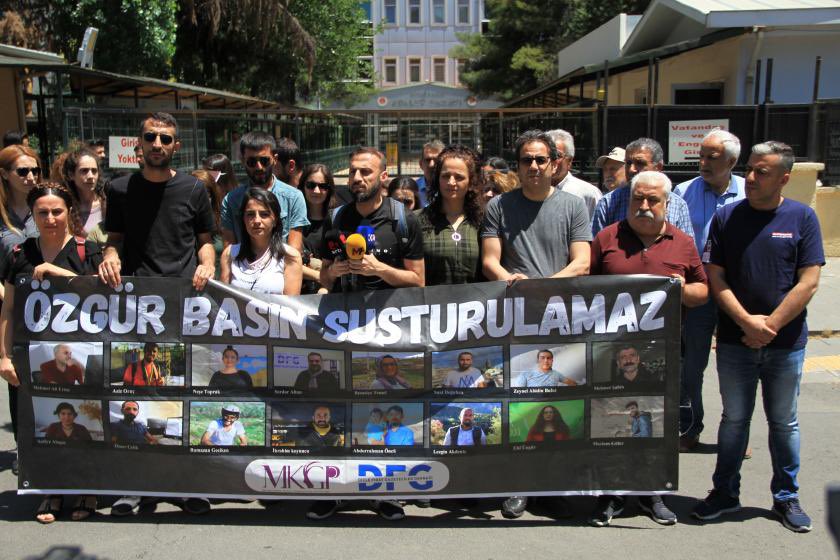Eighteen Kurdish journalists, 15 of whom have been in pretrial detention since June 2022 on terrorism-related charges, appeared in court for the first hearing of their trial on Tuesday, the Artı Gerçek news website reported.
A total of 21 people, including 18 journalists, were detained in southeastern Diyarbakır province in June 2022. They were indicted on terrorism charges 10 months after their detention.
Fifteen of the 21 detainees, including Serdar Altan, co-chair of the Dicle Fırat Journalists Association (DFG), Mezopotamya news agency (MA) Editor-in-Chief Aziz Oruç and JinNews News Director Safiye Alagaş, were arrested after they had been held in custody for eight days, in a move that sparked outrage among opposition politicians, members of the press and rights activists.
Tuesday’s hearing attracted widespread attention from local and international press organizations and rights activists. The journalists charged with membership in a terrorist organization, a charge frequently faced by Kurdish journalists in Turkey due to their reports about Kurds’ problems and the outlawed Kurdistan Workers’ Party (PKK), listed as a terrorist organization by Turkey and much of the international community.
A prison sentence of up to 15 years is sought for the journalists, who are standing trial at the Diyarbakır 4th High Criminal Court.
The hearing was followed by Reporters Without Borders (RSF) Turkey representative Erol Önderoğlu, Turkish Journalists Union (TGS) President Gökhan Durmuş and PEN Norway representative Caroline Stockford in addition opposition lawmakers, union representatives and lawyers.
DFG Co-chair Altan, who was the first to present a defense, delivered his statement in Kurdish. He said just as Kurds and their identity are not recognized in Turkey, their media is not recognized, either.
“The Kurdish press has always been the subject of censorship and pressure. Our arrest is a sign of this,” he said, lamenting that the jailed journalists’ cameras and computers are shown as criminal evidence by the pro-government media.
Altan said although prosecutors drafted a 728-page indictment against them, there is actually not any concrete evidence of crime in the text.
He said although the indictment accuses him of membership in a terrorist organization, there is no evidence supporting the charge.
“How can a person be a terrorist organization member only by speaking,” he asked.
One of the jailed journalists, Ömer Çelik, said producing a TV program in Kurdish and speaking in Kurdish are seen as criminal activity, according to the indictment. Çelik said everyone is aware that if the government had not ordered the prosecution of the journalists, there would not by any such trial today.
According to the journalists, they are being punished due to their journalistic activities and their coverage of issues related to Kurds and the country’s Kurdish issue.
The Kurdish issue, a term prevalent in Turkey’s public discourse, refers to the demand for equal rights by the country’s Kurdish population and their struggle for recognition.
A statement released by RSF Turkey representative Önderoğlu on the RSF website accused Turkey of wrongly considering that the professional activities of certain journalists are signs of legitimization of the PKK, saying that the authorities include in the accusations the collaboration with local Kurdish production companies (Pel, Ari and Piya), the sharing of posts on social networks on the Kurdish issue and their use of the term “war” for conflicts in northern Syria and northern Iraq.
“The recurring use of abusive detention had made Turkey in 2016, 2017 and 2018 one of the biggest prisons for journalists in the world. Despite a dozen releases over the past two months, the situation for media professionals remains just as alarming. Justice must once and for all stop using these political detentions and release the 15 journalists imprisoned in an abusive manner,” said Önderoğlu.
Rights groups routinely accuse Turkey of undermining media freedom by arresting journalists and shutting down critical media outlets, especially since President Recep Tayyip Erdoğan survived a failed coup in July 2016.
Turkey is ranked 165th in the Reporters Without Borders (RSF) 2023 World Press Freedom Index, among 180 countries, not far from North Korea, which occupies the bottom of the list.

